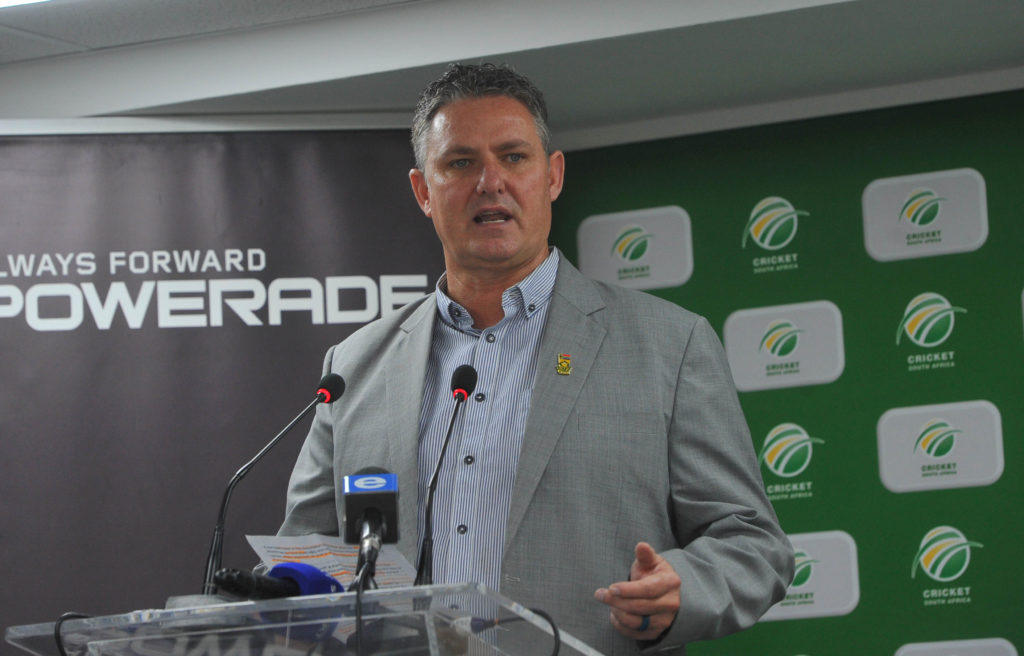Cricket South Africa is looking to use the current Covid-19 pandemic to its advantage and generate welcome income for the financially struggling board, writes ANDRE HUISAMEN.
Monday’s war of words between the South African Cricketers’ Association (Saca) and CSA was reminiscent of the drama at the end of last year when the governing body made headlines for all the wrong reasons.
Pressure piled on CSA in December when CEO Thabang Moroe was placed on paid suspension, pending a six-month investigation, mere hours after title sponsor Standard Bank announced it would not extend its contract with CSA when it expired at the end of April this year.
Prior to that CSA was entangled in an ugly legal battle with Saca and caused outrage with the controversial sacking of senior officials Corrie van Zyl, Naasei Appiah and Clive Eksteen, while its revoking of various journalists’ accreditation during the Mzansi Super League added to the unfolding nightmare.
Saca questions CSA’s handling of Moroe
At the heart of it all, though, sat a major financial crisis seemingly destined to cause the complete collapse of South African cricket.
At its 2019 annual general meeting, CSA declared a loss of R200 million for the 2018-19 financial year, boiling down to an expense cost of R1.2bn.
It was clear that the leadership had become the core problem of the trouble mounting at CSA, with Saca calling for a discrete financial investigation into the operations of the governing body.
Not to mention that CSA has paid up to R2m the last six months towards Moroe’s salary.
Issues of misconduct, credit-card abuse and poor governance prompted the quick suspension of Moroe in early December. It will be naïve, though, to conclude that he was solely responsible for the mess that transpired.
But, the dawning of 2020 seemed to spark new belief and hope that CSA can make its way out of troubled waters and search for a potentially profitable future.
Feedback from the new acting CEO of CSA, Jacques Faul, has been consistent that structure and good governance are of the highest priority.
CSA delighted with government ruling
The coronavirus pandemic, though, has unfortunately dampened expectations of decent income as the Proteas’ tours of India (March), Sri Lanka (June) and now possibly West Indies (July) have all been cancelled or postponed.
But, three weeks ago Faul and director of cricket Graeme Smith revealed to journalists that they travelled to India in February to meet with the BCCI and had since confirmed a scheduled T20I series between the Proteas and India in South Africa in August, should both governments allow it.
On Sunday, Rapport indicated that CSA could earn as much as R180m out of TV revenue from just the three T20I matches against India.
Throughout the Covid-19 pandemic, CSA has also often stated that it was constantly talking with the English Cricket Board (ECB) about ways to cope with the effects of the virus on a cricket front, while towards the end of last week rumours began to surface that England could tour South Africa again in December for an ODI and T20I series should the T20 World Cup be postponed.
The present financial strain on sporting bodies across South Africa is indeed worrying, because there isn’t much that they can do under the circumstances. But, from a cricket point of view, it is encouraging to see CSA working on methods to pocket some cash in these unprecedented circumstances.
A series against England could potentially generate the same amount of money, even more, from TV revenue as would the Indian tour.
Adding to that, CSA is also nearing an agreement with SuperSport to buy the rights of the third Mzansi Super League after giving it to the SABC for free in 2018 and 2019. A deal between CSA and SuperSport will lead to much-needed extra income in comparison to the loss they suffered with the MSL the past two years.
CSA’s problems are by no means a thing of the past. In fact, it is probably more centred at the moment due to all the uncertainty.
The proposed tours of India and England aren’t dead certs at all and a lot will have to happen in South Africa before that become a reality.
But, it is definitely optimistic and encouraging to see CSA work on ways and methods to adapt and adjust to the current challenge, which could be highly beneficial financially.







